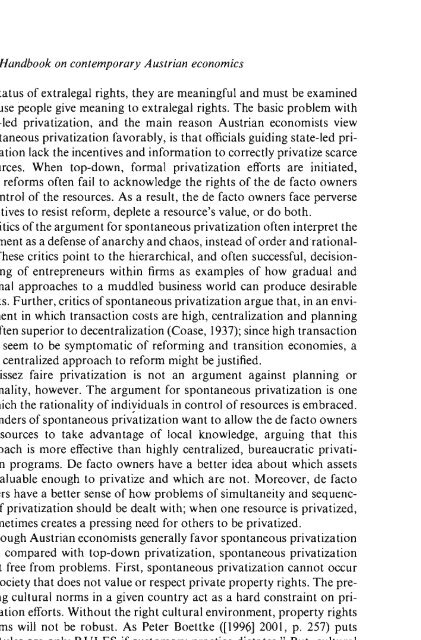Handbook on Contemporary Austrian Economics
Handbook on Contemporary Austrian Economics
Handbook on Contemporary Austrian Economics
You also want an ePaper? Increase the reach of your titles
YUMPU automatically turns print PDFs into web optimized ePapers that Google loves.
84 <str<strong>on</strong>g>Handbook</str<strong>on</strong>g> <strong>on</strong> c<strong>on</strong>temporary <strong>Austrian</strong> ec<strong>on</strong>omics<br />
the status of extralegal rights, they are meaningful and must be examined<br />
because people give meaning to extralegal rights. The basic problem with<br />
state-led privatizati<strong>on</strong>, and the main reas<strong>on</strong> <strong>Austrian</strong> ec<strong>on</strong>omists view<br />
sp<strong>on</strong>taneous privatizati<strong>on</strong> favorably, is that officials guiding state-led privatizati<strong>on</strong><br />
lack the incentives and informati<strong>on</strong> to correctly privatize scarce<br />
resources. When top-down, formal privatizati<strong>on</strong> efforts are initiated,<br />
these reforms often fail to acknowledge the rights of the de facto owners<br />
in c<strong>on</strong>trol of the resources. As a result, the de facto owners face perverse<br />
incentives to resist reform, deplete a resource's value, or do both.<br />
Critics of the argument for sp<strong>on</strong>taneous privatizati<strong>on</strong> often interpret the<br />
argument as a defense of anarchy and chaos, instead of order and rati<strong>on</strong>ality.<br />
These critics point to the hierarchical, and often successful, decisi<strong>on</strong>making<br />
of entrepreneurs within firms as examples of how gradual and<br />
rati<strong>on</strong>al approaches to a muddled business world can produce desirable<br />
results. Further, critics of sp<strong>on</strong>taneous privatizati<strong>on</strong> argue that, in an envir<strong>on</strong>ment<br />
in which transacti<strong>on</strong> costs are high, centralizati<strong>on</strong> and planning<br />
are often superior to decentralizati<strong>on</strong> (Coase, 1937); since high transacti<strong>on</strong><br />
costs seem to be symptomatic of reforming and transiti<strong>on</strong> ec<strong>on</strong>omies, a<br />
more centralized approach to reform might be justified.<br />
Laissez faire privatizati<strong>on</strong> is not an argument against planning or<br />
rati<strong>on</strong>ality, however. The argument for sp<strong>on</strong>taneous privatizati<strong>on</strong> is <strong>on</strong>e<br />
in which the rati<strong>on</strong>ality of indiyiduals in c<strong>on</strong>trol of resources is embraced.<br />
Defenders of sp<strong>on</strong>taneous privatizati<strong>on</strong> want to allow the de facto owners<br />
of resources to take advantage of local knowledge, arguing that this<br />
approach is more effective than highly centralized, bureaucratic privatizati<strong>on</strong><br />
programs. De facto owners have a better idea about which assets<br />
are valuable enough to privatize and which are not. Moreover, de facto<br />
owners have a better sense of how problems of simultaneity and sequencing<br />
of privatizati<strong>on</strong> should be dealt with; when <strong>on</strong>e resource is privatized,<br />
it sometimes creates a pressing need for others to be privatized.<br />
Though <strong>Austrian</strong> ec<strong>on</strong>omists generally favor sp<strong>on</strong>taneous privatizati<strong>on</strong><br />
when compared with top-down privatizati<strong>on</strong>, sp<strong>on</strong>taneous privatizati<strong>on</strong><br />
is not free from problems. First, sp<strong>on</strong>taneous privatizati<strong>on</strong> cannot occur<br />
in a society that does not value or respect private property rights. The prevailing<br />
cultural norms in a given country act as a hard c<strong>on</strong>straint <strong>on</strong> privatizati<strong>on</strong><br />
efforts. Without the right cultural envir<strong>on</strong>ment, property rights<br />
systems will not be robust. As Peter Boettke ([1996] 2001, p. 257) puts<br />
it, "Rules are <strong>on</strong>ly RULES if customary practice dictates." But, cultural<br />
problems are not unique to sp<strong>on</strong>taneous privatizati<strong>on</strong> programs; in fact,<br />
they act as a c<strong>on</strong>straint against any kind of reform, whether it be top-down<br />
or sp<strong>on</strong>taneous. Moreover, it is unclear to what extent culture is malleable<br />
and how quickly it can be changed.

















